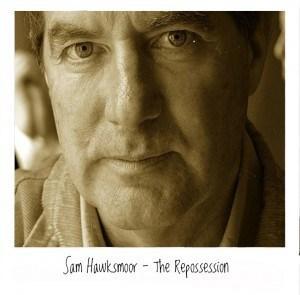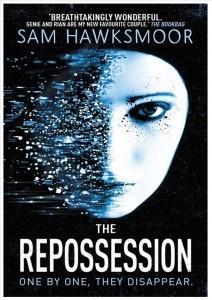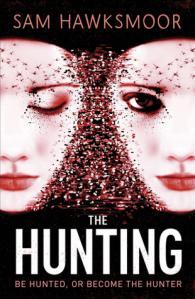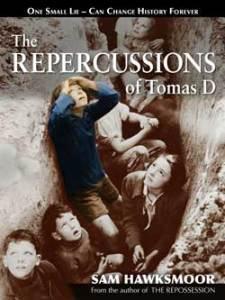Today’s post is given over to one of my Twitter alter ego’s guest author spots, this time featuring YA author Sam Hawksmoor. Though to be fair, I have known Sam since long before I ever had a Twitter persona to call my own. As well as writing teen fiction, Sam has edited a great writer’s website called Hackwriters since 1999 and he has kindly published several of my pieces over the last few years.

According to his author website, Sam has taught creative writing, he wrote for radio and screen, traveled widely and has even done the odd bit of gold prospecting in British Colombia. All of this experience led up to becoming a fully fledged kids’ writer, with two brilliant sci-fi thrillers The Repossession and its sequel The Hunting being published by Hodder last year. The two main protagonists, Genie and Rian weathered many storms together and I’m sure that I’m not the only reader to hope for the ending they deserve in the final volume of their adventure. I was pleased to see that The Repossession has been shortlisted for two book awards, The Leeds Book Awards (May 2013) and the Amazing Book Awards (July 2013).
Sam has gone on to publish a time travel adventure this year, The Repercussions of Tomas D which is as yet only available as an ebook (thus challenging my technological skills). It was worth grappling with the Kindle app, to follow Tomas’ experiences as he inexplicably finds himself in the middle of World War II as Britain struggles to keep going during The Blitz. We may have fantasies about being able to time travel, but what might the consequences be if we could travel in time? Tomas and his not-exactly-girlfriend Gabriella are plunged into a whole new world as a result.
I asked Sam if he would write a piece for The Landing about how he got started writing for teens, how he chooses what to write, what approach he takes to the subjects.
In other words: The ‘Nuts and Bolts’ about writing for a YA audience.
I can say precisely when I decided to write young fiction. It happened the very day that a friend and I were held up at gunpoint at his apartment in Hollywood. They tied us up as they robbed everything he had. I was only visiting, so they had nothing to steal from me. Remember dial phones? Try dialling 911 with the tip of your tongue. A SWAT team arrived real fast but of course the baddies were long gone. But that very evening I had the sudden inspiration to write The Bears You love – a girl, her robot bear, an evil relative who wanted her money and her flight into a desolate climate changed America. That was a long time ago. I wrote it. Couldn’t find a single publisher who’d read it, let alone reject it. Lot of heartache in that book, lying in a suitcase somewhere rotting. Writing for kids wasn’t fashionable back then. And don’t think I was an amateur just having a go. At the time I had two adult novels in print and was working on a third. Just the very idea of writing ‘for kids’ was not really on the radar and a tough story about mega cities of the rich surrounded by scavengers surviving by diving into the city dumpsters wasn’t ‘cute’. ‘Completely wasting your time writing juvenile fiction.’ Said my then publisher at Sphere.

Every writer has tales like these. I have a lot of ‘as yet to sell’ novels awaiting daylight. Who’d be a writer anyway huh? Yet, once you have the idea, you have to put it down and if you’re going to put it down you have to get the end and then… what stick it on Smashwords? Hmmm. After the Bear episode, I was distracted by writing screenplays. If you think selling kids books is hard, trying getting a script made. Yes I had a few optioned, but after knocking my head on many walls I finally realised, hell I need a real job. A salary – a life – before it’s too late. Nothing like teaching students to put you off writing forever it seems. I had to begin at the bottom. No one was interested that I had published anything, especially fiction, (which is sneered at in academic circles I discovered). Real writing was what they did for obscure academic journals peer-reviewed by similar narrow-minded obscurists and the less readable it was the higher the esteem it gained. Anything remotely accessible was clearly garbage. When I finally got to run something (Falmouth Post Grad) I brought my enthusiasm for children’s writing to it.
Times had changed. Someone called J K Rowling was gaining attention. Philip Pullman was respectable and brilliantly written. It was OK to talk about literary values in children’s fiction, study it even. Later I was running courses in Children’s Writing at Portsmouth University and they were massively oversubscribed. Everyone wanted to write for kids and there was a lot of talent there (if not the necessary staying power). I took it further into the MA that I ran there. I decided that here I was discussing all this exciting material, but I wasn’t writing it. My first attempt was something called Mean Tide set in Greenwich, written under a pseudonym and although it was mentored by Beverley Birch at Hodder, it didn’t get through the hoops there. I learned something important though; keep it focussed on the kids. My adults got a lot of equal time in that book, a mistake it seems. I still have a fondness for it, so I put it out on Lulu as a calling card. The Repossession and The Hunting came out of my screenwriting days. I had been working in Vancouver at the time and a number of incidences that my wayward niece and her friends would get up to was kind of shocking to me. How little they thought of their own safety and just how many kids disappeared and how little their families seemed to care.

The central character Genie is based on someone I know. In fact I wrote it for her and she would await each chapter and give me quite harsh notes that I had to take on board. (Yes someone really was forced to live behind bars at home when they came back from school each day – I saw it with my own eyes). The mother was a teacher! Did it turn out all right? No. What happens in those two books and the concerns the kids have follows from observations and talks with Canadian teens. The schools they go to are huge, it’s hard to stand out. Kids work to pay bills. It’s very different to the UK. My nephew’s best friend was blown away – shot at point-blank range – they were just walking from a coffee shop and wham. No reason. Social media is like viral poison. Huge numbers can gang up on you, destroy lives. There is no restraint. I don’t try to adopt their language. Couldn’t even if I tried. It moves on too swiftly. But issues such as love, doubt, fear, peer pressure are universal and tapping into that puts me back in my own school days. It was harsh, yet somehow I survived – and if I could survive, then today’s kids can. That’s how I see it. So when I write fiction for teens I put myself in their shoes. The world doesn’t make sense. Yet more often than not the kids are good, ambitious, want to be something and usually the opposite of whatever is happening at home.
Is the subject difficult? Well putting a kid through teleportation experiments isn’t pretty, especially when you know it’s not going to work. It’s fantastical, but rooted in the tradition of experimental science. I’m trying to keep my feet on the ground, rather than write something that couldn’t be believed. In Repercussions of Tomas D, I’m playing with time travel. In time stories you can spend a lot of time building a machine and all that. But I rather liked what happened in ‘The Butterfly Effect’ and for my ‘hero’ Tomas D it’s something that happens to him, not a choice. I like the idea too that in creating a ‘hero’ that stops the war, he automatically becomes the greatest traitor that ever lived. The fun in writing comes with the consequences of the situations you create. Tomas D’s girlfriend is left behind and discovers the day after Tomas disappears that she is the only person in her school who remembers that Germany didn’t win the war.
To be honest that’s the fun part of writing, inventing a new present for young Gabriella to live in. Dealing with the past is about research. But here again I draw upon two personal experiences. One is the beach I frequent each year in France where the German gun emplacements are still intact. 70 plus years on, there is a visible reminder of war every hundred yards or so along the French coast. That and finding a picture of my grandfather buried up to his neck in rubble – still alive – from a German air raid on Lincolnshire. This was the second time he had been bombed. The first time was in 1914 when a German Zeppelin dropped a bomb on his home killing his brother and parents. There’s a photo of him in his pajamas standing in his bedroom with the front of the house blown off. So for Tomas D to have this nightmare about being buried alive by German bombs – it comes from a reality.

How will this appeal to teens or young readers? Hmm. In doing my talks to schools, I am acutely aware of how little history is taught and how varied. Increasingly the names Hitler and Churchill mean nothing (unless it is a nodding dog on TV) so the story of a boy going back in time and altering everything really only appeals to a kid who knows something about our Island story. (I should send a copy to Michael Gove). This is why publishers increasingly are wary of publishing ‘historical fiction’ I guess. I would argue that history – especially ‘economic’ history should be a much bigger part of curriculum’s to provide a better understanding of how society works and where it is going. I am but a straw in the wind on this. I am in progress on a number of works. All YA fiction. One survival story set again in Canada, the second in a parallel London at war with the French. I live in hopes they will see the light of day.
I take the business of writing for kids very seriously. Some of the best fiction ever written is I would argue for kids. Incarceron by Catherine Fisher for example. Clever on so many levels and stretches the imagination. Never dumbed down and it’s inspirational. Ship Breaker by Paulo Bacigalupi one of the most vivid and yet plausible visions of our future on this planet. Hopefully one day I’ll find a way to do that myself.
Sam Hawksmoor 2013
Sam Hawksmoor … until recently was the Course Leader for the MA in Creative Writing at Portsmouth University and a similar programme in Falmouth, Cornwall. He is the joint-editor of Hackwriters.com. Sam is the author of ‘The Repossession’ and ‘The Hunting’ with Hodder Children’s Books. Sam currently lives in windswept Lincolnshire but misses Vancouver, the mountains and the coffee bars, the setting for several of his YA novels.
Credits: author photo and bio taken from Leeds Book Awards site; other pictures from author’s own site.

